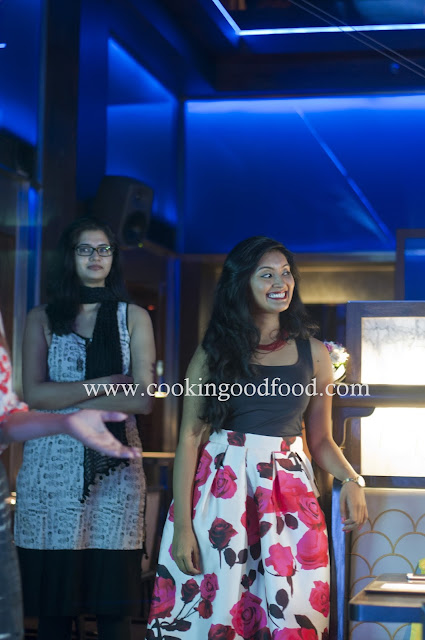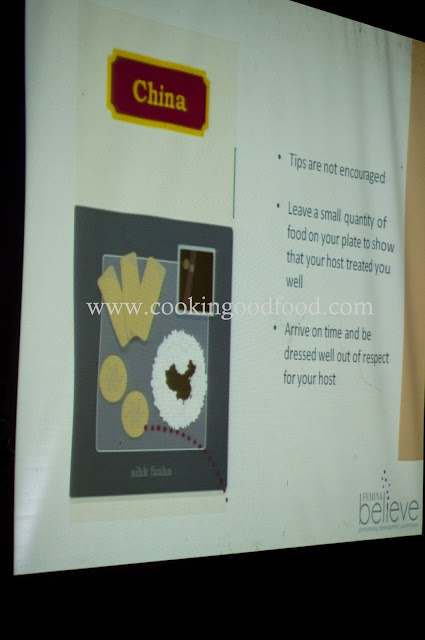Hello All!
‘Etiquette’ : this word is normally picked up by children in
their foundation years from their parents and the school teachers. At that age
probably they do not even understand what the word means but as one grows, the
importance of the word sets in life. The word ‘etiquette’ means, a code of
conduct, a social norm that suggests a sense of dignity or appropriate
behaviour. The word itself has been derived from a French word which means ‘a
tag’.
 |
| Greeshma Thampi |
Whether it’s a student, a teacher, worker, doctor, chef or a
person from any walk of life, etiquette are important and each profession has
it’s own set of rules to be followed and categorised under etiquette. When Femina Believe approached
me asking if I would be interested in attending a customized workshop on ‘Dining
Etiquette’ created by them and conducted by their expert Greeshma Thampi at Hakkasan,
Mumbai, I happily accepted it as I was keen on learning. Understanding the
nuances of fine dining would definitely help me as a food blogger and also as
wife where I need to entertain people from the corporate world, who would not
essentially be only Indian.
It was a three hours interactive session. What I understood
during the workshop was that ‘Dining Etiquette’ is a very broad term and it
covers aspects right from setting the table, table manners, restaurant dining
etiquette, wine etiquette, International dining etiquette and more.
I would actually call it a ‘How Not To Eat’ workshop. There were
many things which most of us have been following in our lives without knowing
that it actually is a dining etiquette. This workshop clearly defined that for
me and it did open a new window which I would like to explore more in future.
The expert (Greeshma Thampi), started the workshop by explaining the difference between a formal
and an informal table setting. She then further explained various meal courses
and the nuances of each course. She stressed on the importance of the portion
size during a seven course meal and how a sorbet plays an important role of a
palate cleanser.
Greeshma, explained the science behind using different kinds of
glasses for serving wine. I realised how important it is choosing the right kind
of glass for having a good wine experience. The red wines are best served in
large wine glasses with a larger opening of the bowl. The larger surface area
allows one to sniff into the glass from a closer distance, to detect the aroma, also it allows the
wine to come in contact with the air. Contrary to the red wine glass, the
champagne glass has a very small mouth and is upright, this prevents the
carbonised gas to escape and also captures more flavour.
Greeshma, gave us easy ways to remember things, for example the
acronym BMW, that’s an easy way to remember bread, meal and water. Which means as one starts from his left and makes way to the right, first
is the bread plate, followed by the meal plate and then the water.
Similarly, in a formal table setting it’s difficult to
understand which spoon or knife to use first. So the thumb rule is to start from
the outside and then move in. Greeshma, emphasised on the basics which most of us
knew but it was fun going through the old notes once again, like while using knife and fork, first use fork to pierce and then cut
with the knife. The knife should always cut at an angle for easier cutting.
Also, while eating the fork should never face up. Never tuck the napkin in the
shirt or tie around the neck except when in the aircraft. It should always be spread
on the lap.
There was also an introduction to the dining rules to be
followed in various countries. A few of the interesting rules that I picked up
during the workshop were- In Thailand and China it is found disrespectful to eat
the last portion of the food on the plate. Always leave a small quantity of food
on the plate to show that the host has treated you well. In France it’s
disrespectful to share the bill, only one person should pay the bill and in
Japan it’s considered rude if tips are not given.There were many more
interesting and important international dining rules which one could learn during
the workshop.
Femina Believe conducts these workshops in Mumbai,
Delhi and Pune. These are short duration workshops for 1 or 2 days at
an affordable cost. Other than the Dining etiquettes they also conduct workshops
on Communication skills and body language, Styling, Makeup.
 |
| Pic Coutesy: Femina Believe |
The highlights of the work shop were definitely learning to use
chopsticks and the amazing food at Hakkasan. We were given a hand’s on training
for using chopsticks and then to encourage us to use it more and also to
provide us practice, we were asked to play a game of picking peanuts in a one
minute game.
Later, we used the chopsticks to enjoy our meals at Hakkasan.
The food was extremely delicious and I still dream of the savoury carrot cakes
which were served there. They were simply melt in mouth and left the palate
bursting with flavours. I also liked the Mix veggies in Asam sauce, Crystal
dumplings and Chocolate Mousse. Hakkasan, specialises in modern Cantonese cuisine and all the
items on the menu that were served to us were made from fresh ingredients and
that reflected in the taste and flavour of the food. I would highly recommend
Hakkasan for an epicurean experience created by a Michelin Starred Chef. It’s a
fine dining restaurant located in the buzzling Bandra West.
More details of the various work shops conducted by Femina Believe, can be checked from their website www.feminabelive.com or one can also call them at
09222244347 or follow them through social media
Facebook: www.facebook.com/FeminaBelieve
Twitter: @BelieveFemina
Instagram: @FeminaBelieve







2 comments:
hello Godu
it is a classic and beautiful expression presented by you about your epicurean experience in Hakkasan making anybodys mouth water.KaKa
Thanks Kaka, glad you liked it.:)
Post a Comment